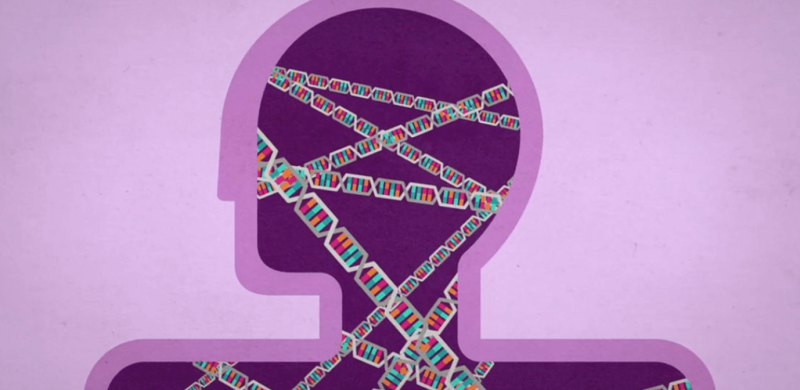There is a sliver of correlation to give credence to the suit. Research in the European Journal of Epidemiology in June 2021 did not prove the link but found that children exposed to Tylenol during pregnancy were 19% more likely to have autism spectrum disorders and 21% more likely to have ADHD symptoms compared to non-exposed children. And is often the case, this association, however tenuous, has sparked a slew of ambulance-chasing tort lawyers eager to capitalize on the ambiguity and pain.
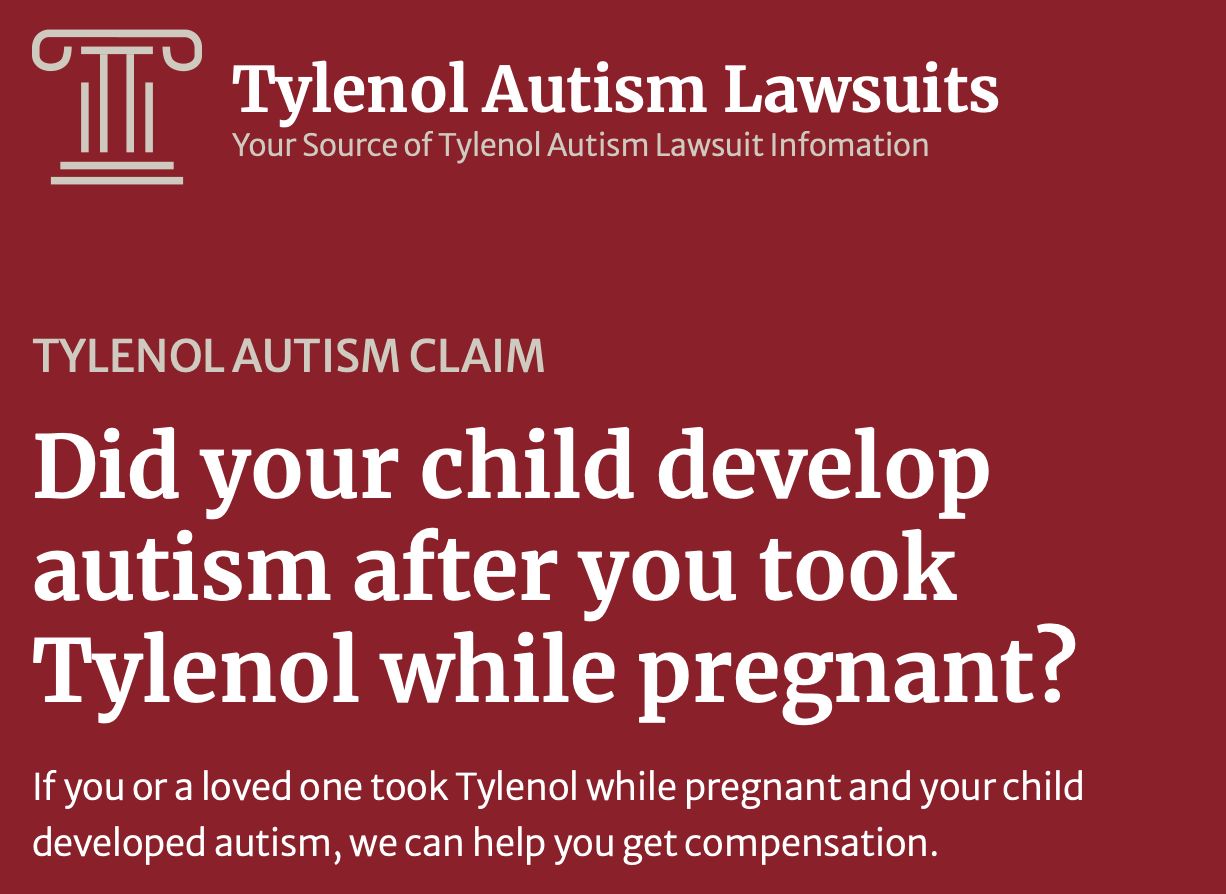
The multiple factors that cause autism is one of the most hotly debated medical mysteries of our time — not just on the web by parents frustrated that a loved one has been afflicted, but by scientists weighing the various environmental and genetic factors that could be in play. We now are a little closer to understanding the genetics that might trigger the disorder.
One of the largest studies into autism spectrum disorder (ASD) reveals a wealth of new insights into the genetic roots of the condition. Previous work in the field has highlighted that severe cases of autism have a clear genetic link to about 60 identified genes, but those findings only accounted for around 20% of all cases.
This latest work builds on the data that provided some insight into the roots of the variety of cases that span the entire spectrum of autism. It’s the latest in a flurry of studies that all point towards a genetic underlying cause in autism. As professor of paediatrics at Columbia and research lead Dr. Wendy Chun highlights:
We need to do more detailed studies to understand how each gene contributes to the features of autism. But we think these genes will help us unravel the biological underpinnings that lead to most cases.
Earlier this month, a collaborative study by more than 100 researchers studying the entire human genome of autistic people linked autism to 134 specific genes, impacting about 14 percent of the autistic population. More genes are being identified every month. Additional research linked autism to dysfunction in the brain circuits, linked to gene variants in the brain. And a 7-year study found that a gene mutation known to be associated with the disorder causes an overstimulation of brain cells far greater than that seen in neuronal cells without the mutation.
It appears that at least 80% of autism is genetic and may be hereditary, although the exact mechanism is complex. We have known since the 1970s that autism has a genetic component but it is clear that, unlike disorders such as cystic fibrosis, there isn’t a single gene responsible for the development of ASD. Instead, it appears over 100 genes can be linked to its development. Many of these genes are associated with the development of communication between brain cells, and it appears to be a combination of multiple genetic variations that triggers the development of ASD. All this culminates in one clear conclusion; the biological ‘decision’ as to whether a child develops autism is made before birth.
This is a critical point to consider as we navigate through this age of social media and online conspiracy theories. Autism has been a drum that conspiracy theorists and pseudoscientists often bang with great enthusiasm. Over the years we have seen many unsubstantiated and frankly bogus claims linking things like chemicals and GMO foods to autism — or is it organic food that causes autism?
The most infamous misguided claim is that “vaccines cause autism.” No, they don’t. No study suggests that. The CDC has had to rebuff it, writing:
Some people have had concerns that ASD might be linked to the vaccines children receive, but studies have shown that there is no link between receiving vaccines and developing ASD.
There is no evidence to support the claim. It was a familiar trope in the liberal community for years pre-COVID, with much of the disinformation emanating from Hollywood celebrities. Anti-GMO proponents regularly claim, based on correlation, that ‘glyphosate causes autism’. Well, so does organic food. Such conclusions use cherry-picked correlative data that never proves any biological link to the development of ASD.
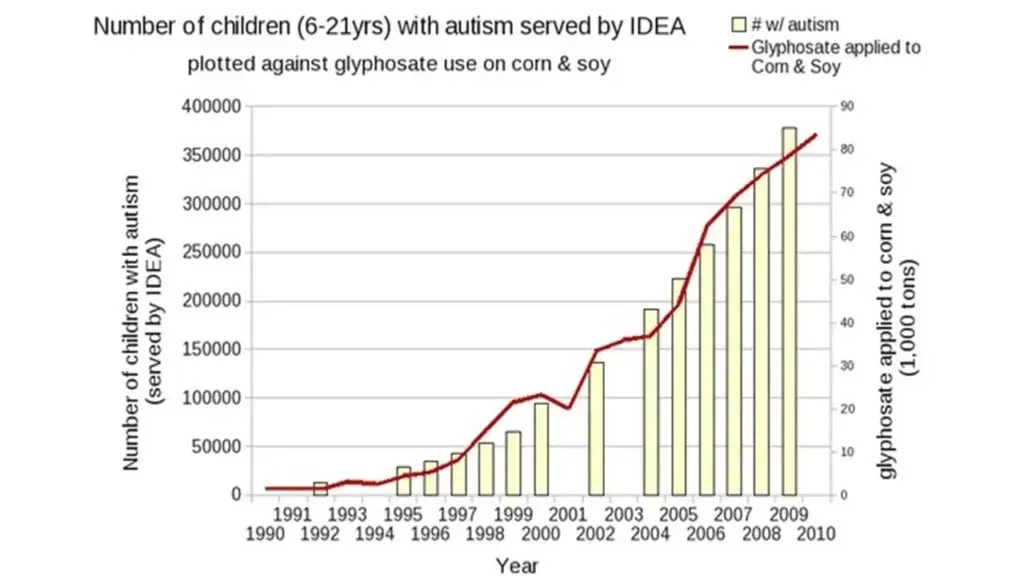
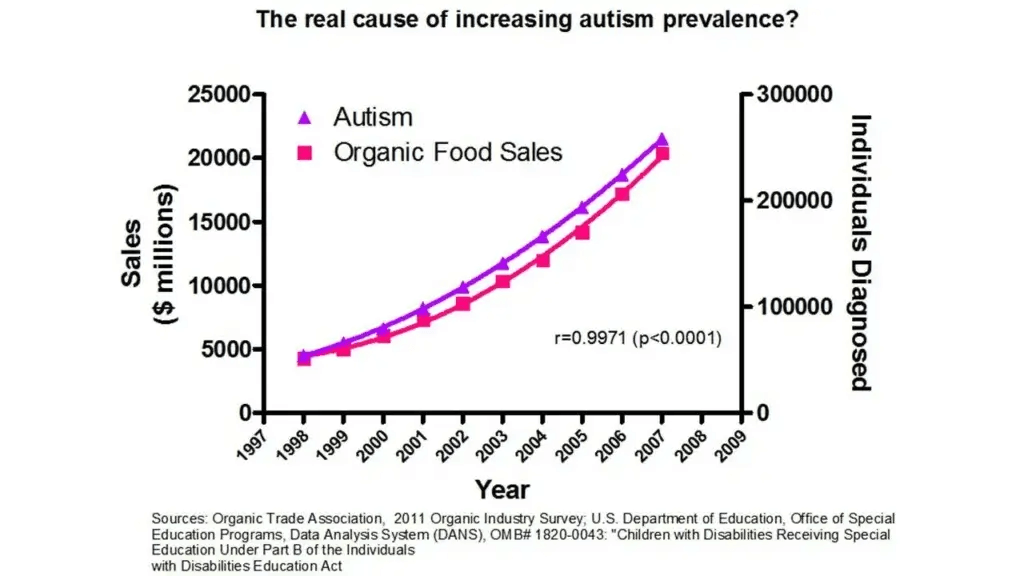
We reached out to Prof. Peter Hotez, Co-Director of the Center for Vaccine Development at Texas Children’s Hospital:
[W]e now have in-hand an overwhelming body of scientific evidence and published papers refuting any vaccine and autism link. Moreover, we do not even have reasonable plausibility for linking vaccines to autism given the array of autism genes discovered to date and the findings that autism is a complex spectrum that begins in early to mid-fetal brain development in utero. The point is, the neurodevelopmental processes leading to autism or its related and companion intellectual disabilities begin well before birth, and well before a child receives his or her first immunization.
In short, any ‘study’ that links an external environmental factor to the development of ASD is likely presenting nothing more than a false, misleading correlation.
The development of autism is genetically determined before birth, long before any external factor can have an influence. Many epidemiological studies have been conducted around this issue with vaccinations being the main point of focus. After looking at data from millions of children, one key finding emerges; children who are vaccinated are no more or less likely to develop autism than children who are unvaccinated. It has zero impact. None at all.
So, given that there is no evidence for this link, why then does it seem to still hold a significant place in online spaces? According to behavioral studies, social media is a big influencer of such beliefs. An alarmist headline is enough to make people believe something insidious is true, especially when it puts people they care about at the center of the so-called “danger”.
Origins of the vaccine scares
The ‘vaccines cause autism’ fears began getting traction in 1998 when The Lancet published a paper that claimed to evidence a link. It is probably one of the best examples of terrible science and how it got published is a mystery to any scientist who has the misfortune of reading it. Within the paper, the author admits nothing is actually proven. The methodology was essentially: “these kids were vaccinated and have autism… there must be a link”.
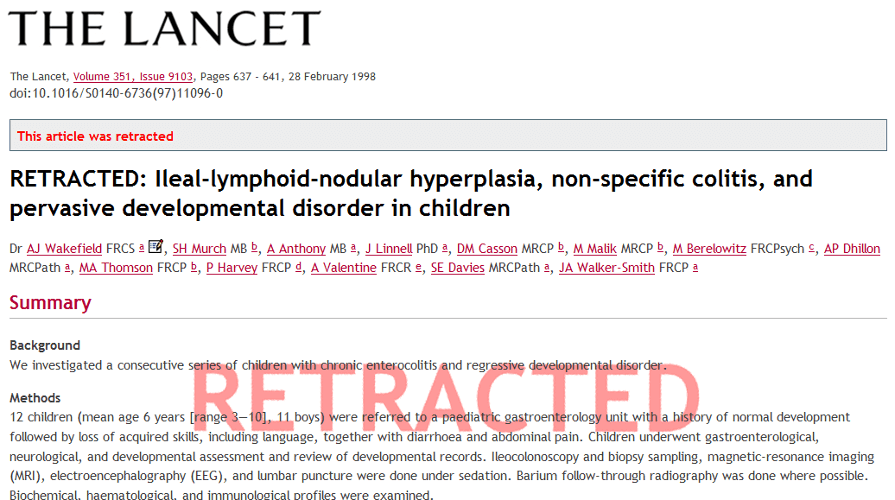
The journal since retracted the paper from publication, but the permanent poisoning of the media well has occurred, and the disinformation metastasized across the web. It was absurd, but it was enough to spark decades of mistrust. Part of the communications failure was due to coincidental timing between MMR vaccination and the common window of autism diagnosis, Dr. Hotez explains:
When you get the MMR vaccine you are 12-15 months of age. Autism will begin within the first or second year of life so it’s logical to want to connect the two but now we know it’s not even plausible. You can go back prenatally and determine which kids are going to develop autism.
In other words, it is natural for parents to look for a reason when a child gets diagnosed with ASD. They look for something to explain, sometimes stumbling upon people online claiming to be experts who tell them it’s their fault their child has autism because they were vaccinated. Often, because the diagnosis comes shortly after the vaccination, they believe that the two are linked but it is pure coincidence.
Dangerous misinformation
Why the concerns? Firstly, they promote mistrust in our hugely reliable and safe vaccination systems developed in Western countries. Despite a wealth of evidence that there is no link between the MMR vaccine and autism, vaccination rates among children in the US have been continuously falling. It’s an example of something known as Brandolini’s Law; ‘the amount of effort to debunk misinformation is orders of magnitude greater than the amount of effort it took to put it out in the first place’. It’s much easier to spread misinformation than to refute it and that makes it incredibly dangerous.

In this case, it has led to 25 million children missing their first dose of the MMR vaccine in 2021, sparking outbreaks of measles in states like Ohio. This is the same measles that was responsible for over half of all childhood deaths from infectious diseases before the vaccine was developed. It’s easy to dismiss followers of such conspiracy theories as harmless nuts but the reality of their impact can be children not getting vaccinated against the biggest child-killer in recent centuries.
The spread of misinformation also has led to a mistrust of the true ‘experts’: the doctors and scientists doing real research and trying to help. An increase in parents trying ‘alternative therapies’ on their autistic children has coincided with the rise in vaccine hesitancy.
Perhaps the most notorious is a truly horrific method of feeding a child bleach to try and ‘cure’ autism. We have scientologist Jim Humble to thank for that. He has written several books in which he claims he can cure anything with bleach. Ingestion of bleach is highly dangerous and can prove fatal.

“Any amount of bleach and any concentration of bleach is capable of causing a chemical burn, and so the bottom line is that there really shouldn’t be any exposure,” says Dr. Cyrus Rangan, a medical toxicologist at the California Poison Control system.
The dangerous practice became so widespread that the FDA has had to release a statement detailing reports of “people experiencing severe vomiting, severe diarrhea, life-threatening low blood pressure caused by dehydration, and acute liver failure”. It’s a fatal mix.
How do we combat such dangerous misinformation? The positive is that the science is on our side and every day the evidence base grows stronger and stronger. It’s easy to blame the people who believe the misinformation that is scarily accessible online, but if we are going to promote people to reconsider it is important to understand that they are the victim of manipulative conspiracy pushers. As Dr. Rangan explains, “Usually there’s no evidence for it, but they sort of prey on these families who are just looking for cures or treatments.”
The best thing we can do is follow the science and try to engage with the hesitant knowing that the weight of evidence is on our side. Misinformation is often easily spread because it plays on emotion. It provokes an emotional response, so we must do all we can to respond with pragmatism and evidence.
Sam Moxon has a PhD in tissue engineering and is currently a research fellow in the field of regenerative medicine. He is a freelance writer with an interest in the development of new technologies to enhance medical therapies. Follow him on Twitter @DrSamMoxon

